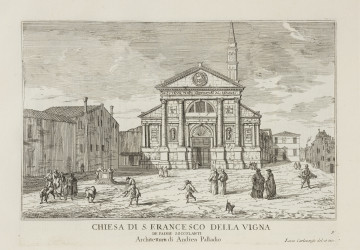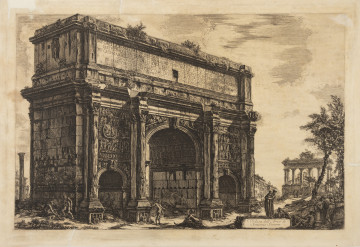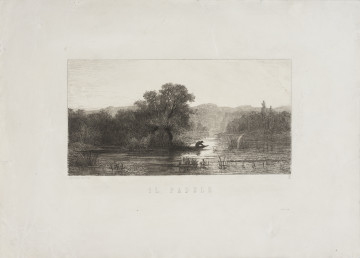
Chiesa di S. Francesco della Vigna | St. Francis church in a vineyard
1768
National Museum in Szczecin
Part of the collection: Italian graphics
A view of the Piazza Santi Giovanni e Paolo development in Venice's Castello, on the Rio dei Mendicanti canal facing the Renaissance headquarters of the Brotherhood of St. Mark (Scuola Grande di San Marco). The edifice was built between 1488 and 1495 by Pietro Lombardo, Marco Codussi and Bartolomeo Bon, and Jacopo Sansovino. The top of the building's façade is decorated with a winged lion, an attribute of Venice's patron saint. The entrance is guarded by two lions flanking the sides. To the right of the square, you will find the Gothic church of San Zanipolo (Saints John and Paul). The foreground features an equestrian statue of the mercenary Venetian army commander, condottiero Bartolomeo Colleoni (1400-1475), chiseled by Andrea dell Verrocchia (1435-1488), dating from 1481 to 1488, a copy of which can be found in Szczecin's Pl. Lotników. In the piazza from the engraving one shall see a number of passers-by, clergy and laymen, and several of them presumably playing dice right by the statue. The featured board 39 comes from the second edition of the album Le fabriche, e vedute di Venetia with views of Venice. Luca Callevarijs (1663-1730) was the author of the etchings based on his own designs. The album, first edition of which came out in 1703, features 103 engravings preceded by a dedication with a panorama of Venice and a title page. Having been purchased for the National Museum in Szczecin in Poznań in 1977 from a private individual, the copy came from the collection of Anton Paul Heinlein (1715-1795), a Nuremberg merchant and collector of oil, glass and enamel paintings, sculptures and other works of art. It is also known to have been procured by D. Meyer at an auction of Johann Andreas Boerner's antique shop in 1832. Luca Carlevarijs was an architect, mathematician, engraver as well as painter. His father, an architect and engraver, Giovanni Leonardo moved the family to Venice in 1669, where Luca himself developed a taste for landscape, architectural views, marine themes and decorative painting. He is considered the father of Venetian vedute and his works were popular among the Venetian bourgeoisie. Ewa Gwiazdowska
Author / creator
Object type
etching (print)
Technique
etching
Material
ribber paper
Origin / acquisition method
purchase
Creation time / dating
Creation / finding place
Owner
Muzeum Narodowe w Szczecinie
Identification number
Location / status

1768
National Museum in Szczecin

not before 1783
National Museum in Szczecin

1870
National Museum in Szczecin
DISCOVER this TOPIC
National Museum in Lublin
DISCOVER this PATH
Educational path